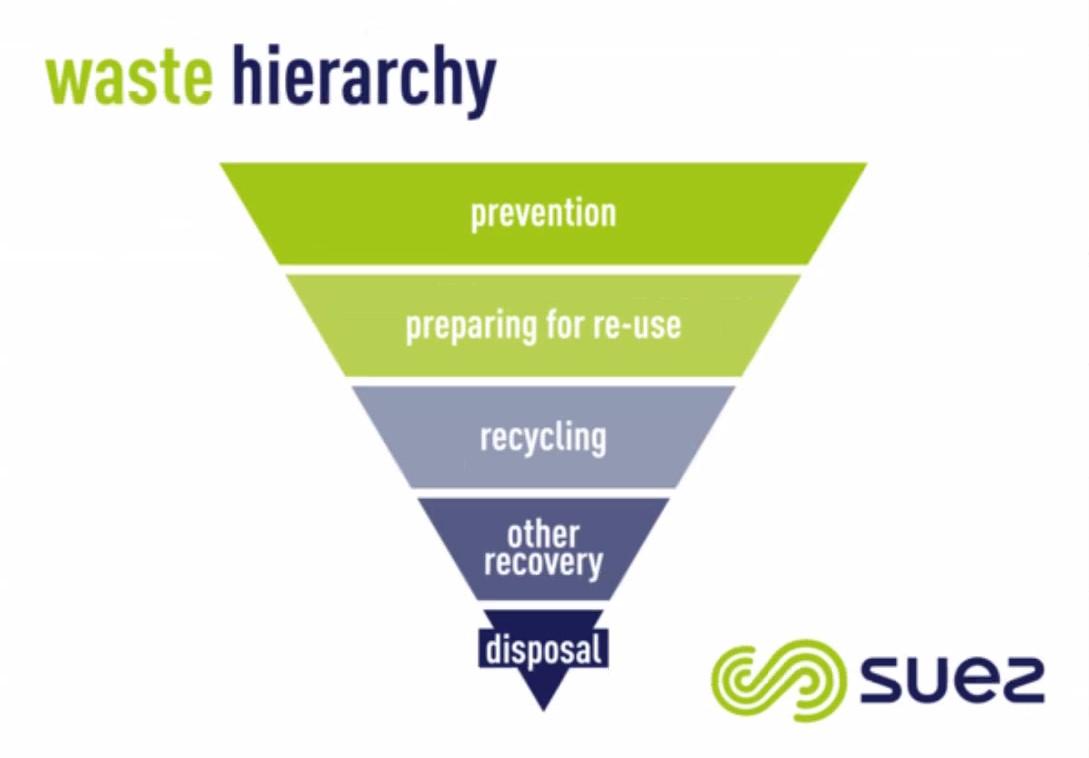Five tips for sustainable waste management in the hospitality industry
With the environmental impact of the hospitality and service industry shifting further into public consciousness, leaders in the hospitality sector are stepping up their efforts to meet changing consumer expectations. With waste management having a key role to play in sustainability, here are five tips to manage your hospitality waste:
Apply the principles of waste hierarchy
All businesses in the UK are required to apply the waste hierarchy to their waste management processes. The hierarchy sets out the priority order for managing waste materials based on their environmental impacts.
As the diagram shows the preference is always to avoid producing waste in the first place.
- Prevention – The ideal option is to prevent waste from being produced in the first place. For example, this could mean selecting items with the least packaging, keeping products for longer, or avoiding single-use items.
- Prepare for re-use – for example by repairing or refurbishing, whole items or spare parts.
- Recycling – where the material be recycled and turned into a new product.
- Other recovery – where the waste can’t be recycled or re-used, can it be processed, for example food waste can go to an anaerobic digestion facility, or other waste can go to facilities to produce the alternative fuels.
- Disposal – at the bottom of the hierarchy, if the waste cannot be recovered for any value, it is disposed in Landfill. Some types of waste, such as hazardous chemicals, cannot be safely recycled or reused and direct treatment or disposal is the most appropriate option for these types of materials. This should only be used as a last resort.
Understanding the waste hierarchy will enable you and your team to gain a greater understanding of hospitality waste, and how it should best be disposed of. Establishing an environmentally sound waste management system is essential.
Reuse and recycle
Single use plastics are becoming a thing of the past, and waste management in hotels and the hospitality sector more widely must move away from long-held practices. The biggest names in the hotel industry are beginning to embrace this and make changes to ingrained methods. Adjustments include switching disposable mini toiletries for refillable dispensers or installing water stations to refill reusable water bottles for example. To meet the expectations of customers and reduce unnecessary waste to landfill, it’s time for hospitality sector to transition from single use plastics to more sustainable alternatives.
Make it easy
Label bins placed within the premises for different types of waste to make it clear where rubbish should go. You could even take it a step further and include some information on what the recycled items might be used for, which can result in consumers prioritising recycling and avoiding the general waste bin where possible. Also, ensure you place the bins in convenient locations to make it easy for your customers to recycle without having to think too much about it. Clear instructions and container labels for your employees, especially teams handling waste is also a critical success factor.
Consider a waste audit
Finding out what sort of waste you’re producing will help ensure that your waste management system is as efficient as possible. For example, food waste should be disposed of separately from general waste. When food waste is mixed with general waste, not only could it end up in landfill, but the additional weight of food waste, could be adding to your waste management bills. Doing a waste audit will enable you to establish ways to improve your sustainable and commercial performance. We can make recommendations based on your waste audit to cut the amount of waste generated internally as well as improving elements of the supply chain to reduce the volume of waste you’re producing.
Choose a sustainable waste management provider
Your waste management provider will be key to ensuring your waste is handled in an environmentally friendly manner, so it’s important to choose a supplier who is aligned with your goals. Waste management suppliers such as SUEZ recycling and recovery UK, can tailor services to the unique requirements of hospitality businesses. We can also offer zero-waste-to-landfill solutions, ensuring your waste will be reused, recycled or used to generate energy. To learn more about SUEZ and how we can help you with sustainable waste management services, get in touch.
